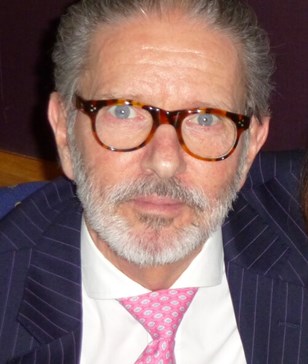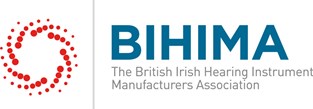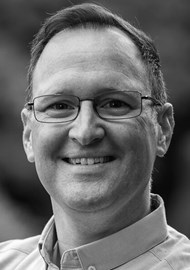With the launch of an exciting new toolkit for GPs and global challenges to the hearing instrument market, it seemed a timely opportunity to catch up with Paul Surridge, BIHIMA Chair, for a virtual coffee and chat about the industry.

Hi Paul, can you give me you ‘elevator pitch’ for BIHIMA?
Gareth, thanks for the opportunity to speak with you. BIHIMA represents, in the UK and Ireland, the main hearing instruments manufacturers. We aim to raise consumer awareness about the latest hearing technology, and to influence government and policy makers to improve the lives of people with hearing difficulties.
How does BIHIMA fit with the European Hearing Instrument Manufactures Association (EHIMA)?
We work in partnership with other professional, trade, regulatory and consumer organisations within the healthcare and charitable sectors. The relationship we have with EHIMA, and especially my opposite number, Stefan Zimmer, is extremely positive. As you know, the key manufacturers fund both organisations; indeed, other associations similar to BIHIMA exist within some of the other European countries too i.e., Italy, the Netherlands, France, Germany. EHIMA is the umbrella Association that we all feed off but certainly in the UK, BIHIMA has its own agenda and board made up of UK managing directors.
With eight of the world’s leading hearing instrument manufacturers around the table, there must be some rivalries. As Chair, how do you manage these conflicts?
That’s an interesting question about conflict, but I fear my answer may disappoint you. Our members get on extremely well together! BIHIMA’s job is not, as you may think, to directly promote our members’ products and services. Quite the contrary, our strategy is much more accented toward promoting hearing health; trying to encourage as many people as possible with hearing difficulties to seek help and advice from the profession. We know there are comorbidities linked to hearing loss, such as dementia and depression, and loneliness from isolation, so our PR and marketing strategy is aimed at raising the awareness of this, fact reaching as many people as possible.
What’s your background in the industry?
I spent almost 20 years in the optical sector and there are many similarities to the hearing sector. I am not a clinician but a businessman and have undertaken CEO and Chairman roles for some years.
We’ve now been in a global pandemic for over a year. How has COVID affected business and how are the manufacturers meeting the challenges presented?
Of course, the pandemic has been shocking for everyone around the world and our hearts go out to all those that have lost loved ones. Like so many other people, I pay tribute to the nurses, doctors and volunteers on the front line that are trying to help save lives whilst risking their own. They really do deserve our grateful thanks.
The pandemic has obviously impacted the hearing aid industry as our core audience is older people; those that have to be especially careful to shield and stay at home. However, this is also the audience that is being vaccinated first so this will help to speed up a return to business as usual.
The sooner we can return to something that resembles normality, the sooner we can reach more people in need. Our greatest concern is the scale of unmet need that will be the fallout of the coronavirus. There are thousands of individuals who will not have sought help during the pandemic. Their hearing loss will have gone untreated, their isolation deepened, and their symptoms will have increased, yet will remain unaddressed. We are hugely concerned by the scale of need that our industry is likely to face. The challenge we have ahead is how to navigate this pent-up demand with as much speed and support as possible, working together as an industry to tackle this.
Solutions to this problem include the continued supply of remote care, increasing the development of tools to help audiologists to deliver this effectively. For hearing instruments, we will maintain focus on elements like remote tuning. It’s essential we keep innovating, working on technology that is flexible to handle the current circumstances.
The sale of hearing instruments worldwide has seen a noticeable decline this past year due to the pandemic, but our member companies are well-run, well-funded and resilient businesses and continue to invest in technological development to improve the experience of hearing instrument users. The last quarter demonstrated a swift increase in demand, as the pent-up need materialised after the first lockdown, and we can expect to see the same again after this second lockdown.
As well as COVID, you have also faced Brexit at this time. With many of your members Europe based, how at this time has Brexit shaped the hearing instrument business in the UK?
I think it is too early to say whether the UK leaving the EU will adversely impact the sale and distribution of hearing instruments here in the UK, but my instinct says it won’t. Of course, there will be some challenges to overcome, as there will be in all sectors but, on balance, I am confident that the profession and those in need of our products need not be concerned.
I notice BIHIMA has taken the ‘hearing instrument’ phrase rather than ‘hearing aids’; what is the philosophy behind this? And what are BIHIMAs views on the over-the-counter debate?
We adopted the word 'instrument' rather than 'hearing aids' when BIHIMA was relaunched some years ago. It is our belief that 'instruments' far better reflects the advanced technology used in the appliances today and indeed in the future.
Regarding over-the-counter products, while we can see this taking off in other countries, it is not on the agenda for the UK. All analysis shows that excellent hearing care can only be delivered with the support of an audiologist. Our members strongly support their essential role in achieving a successful outcome for customers using hearing instruments.
The Royal College of GPs (RCGP), along with RNID and yourselves, has launched a brilliant Toolkit to improve identification and access for the Deaf and Hard of Hearing; can you tell us about this collaboration?
As I mentioned earlier our remit at BIHIMA is not to promote and market our members’ products and services; that is their individual responsibility. Our role is to disseminate strong messaging about the value of wearing hearing instruments with those in need. We have long been aware that GPs who have a lot on their professional plates were not as knowledgeable about hearing instruments and people’s needs as they could be. This issue has only increased following the pandemic, with patients even less likely to approach their GP about concerns over their hearing. When we were approached by RNID to fund a toolkit of GP resources on hearing loss, we were extremely happy to do so. The RNID and the RCGP do some sterling work and it has been a great honour to be involved. The toolkit for GPs is superb, providing training and support around deafness and hearing loss in primary care. We are confident GPs will welcome the additional guidance and support the project delivers.
Our aim in sponsoring this toolkit is to improve patient access to audiology services and ensure that GPs correctly identify and support patients with hearing loss, to deliver the best possible care. We want to encourage all audiologists in the sector to flag these resources to their GP colleagues.
And finally, when life returns to normal, where will be the first place you’ll visit and who will you meet?
To be very honest with you, the first place I will visit is my local tennis club where I will meet my doubles partner for an initial two-hour session! I can’t wait to get back to serious exercise. Of course, I very much look forward to seeing my four children and their partners too. From a business perspective, what could be more enjoyable than a physical board meeting with my BIHIMA colleagues rather than relying on a Zoom meeting, as helpful as they have been!

Interviewed by Gareth Smith




